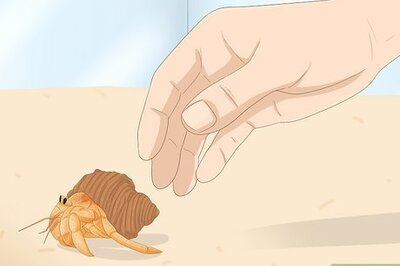
views
- Take a deep breath and work on expressing yourself calmly, apologizing if necessary.
- Build up trust with your partner and address any issues you may be having respectfully, explaining why you feel so possessive of them.
- Take care of yourself and boost your confidence, though it may help to see a professional if the possessiveness gets extreme.
Calming Yourself in the Moment

Take a timeout. When you feel yourself becoming too possessive of your partner, taking a time out to evaluate yourself is a good idea. A little break gives you the chance to think about what you are doing, why you are doing it, and what effect it might have on your relationship. For example, if you are at a restaurant with your partner and notice that you are beginning to feel possessive because the server is smiling at you all, excuse yourself for a moment. Take a mental timeout if you can't leave the immediate area. Take three slow, deep breaths and during that time focus only on your breathing. Use the time to ask yourself why this situation is making you feel possessive. For instance, ask yourself, “Am I feeling jealous? Insecure? Why am I feeling so possessive?”

Express yourself appropriately. It's okay to feel a little jealous or insecure some times. It's also okay to express to your partner that you're feeling this way as long as you do so in the right way. You can be less possessive of your partner if you talk to them and express any feelings of jealousy or insecurity in a calm, mature way. Tell your partner how you are feeling and what you think is making you feel that way. Let your partner know what they can do to help you overcome your feelings. Try saying something like, “I'm feeling kind of possessive right now. It's silly, but I think I'm jealous of the attention you're getting.”

Apologize when you need to. There may be times that you do something that shows how possessive you are before you can stop yourself. If this happens then you need to apologize to your partner and anyone else involved in the situation. For example, if you are rude to a salesclerk because you felt possessive when they greeted your partner, then you should apologize to the salesclerk and our partner. When you are apologizing to someone else, you might say, “I'm sorry for the way I just behaved. It was uncalled for and won't happen again.” When you need to apologize to your partner you can start with, “I need to apologize for the way I acted. I was feeling too possessive. It's no excuse, but it's what happened.”
Building Trust in Your Relationship

Address relationship issues. In some cases, you may feel possessive because things have happened in the relationship that make you question the relationship's stability. If this is the case, you should address the issues with your partner. This way you can resolve the issues, you will know where your relationship stands, and you can start being less possessive of your partner. Tell your partner you'd like to talk about some of the issues you all have been having in the relationship. You might say, “Can we talk about the problems we've been having lately?” Have an open and honest conversation about the things that have been bothering you. Remember that resolving some issues such as past betrayals may take more than one conversation and a bit of time. Leaving these unresolved can also lead to an ongoing lack of trust.

Trust your partner. One of the keys to a successful relationship is trust. You have to trust that your partner cares about you and is honest with you, just as they trust the same things about you. Part of the problem with being too possessive is that it sends your partner the message that you don't trust them. Be less possessive with your partner by having faith in their feelings and their actions. Trust your partner when they say they are going somewhere or doing something. You don't need to check up on them to see if they are being faithful. Believe what your partner tells you. Unless you know for a fact that your partner is dishonest, you should trust what they say. Have faith in your partner's feelings for you. Trust that your partner cares about you as much as they say they do.

Respect your partner. One issue with being possessive of your partner is that it may cause you to act in ways that are disrespectful to your partner, yourself, or others. You may say or do things that are humiliating, patronizing, or hurtful. You can be less possessive of your partner and build a stronger relationship if you make an effort to show them the respect they deserve. Talk respectfully to and about your partner. Don't yell or scream at them or intentionally say things to make them feel bad. Respect your partner's privacy. Avoid going through your partner's things or reading your partner's texts and messages without permission – this most often leads to misunderstanding.

Talk with your partner. Once you realize and admit to yourself that you need to be less possessive of your partner then you should talk to your partner about what has been going on. Talking about it with your partner can help you stop acting on your jealous and possessive thoughts. Tell your partner that you realize that you have been acting possessively lately. For instance, you might say, “Can we talk? I know I've been acting pretty possessive lately.” Explain to your partner how you have been feeling and why you are feeling that way. You could try saying, “I've been feeling jealous because of some past relationship issues I have.” Listen to your partner, as well. This should be a conversation between the two of you. You need to understand how your possessiveness affects them, too.
Preventing Possessive Behavior in the Future

Be honest with yourself. Recognizing that you might be too possessive with your partner is one of the first steps in becoming less possessive. You've also got to be honest with yourself about why you are feeling and acting this way. Being honest with yourself will allow you to address whatever issues you have that are making you be so possessive of your partner. Ask yourself if you are so possessive because of something from your past. For example, did your ex-partner from a previous relationship leave you for someone else? Or, perhaps there was infidelity in your family when you were younger? Determine if there is something your partner is doing that makes you feel possessive. For instance, does your partner flirt a lot with others? Be honest about any self-esteem or self-confidence issues you are having. For example, do you feel unattractive or like your partner is too good to be with you?

Have confidence in yourself. Sometimes you may act possessively because you feel insecure. You may feel that you don't deserve your partner. If you think you might be acting possessive because of personal insecurities or self-doubt, build your self-confidence so that you can be less possessive of your partner. Keep a journal or make a list of all the great qualities about you. List everything from your great eyes to your sense of humor to your love of anime. Use positive self-talk. For example, look in the mirror and tell yourself, “I'm a great catch and Kelsey is lucky to have me, just like I'm lucky to have Kelsey.” Write it down when your partner gives you a compliment or does something to show you that they care.

Take care of yourself. It's a lot easier to get jealous and start acting possessively when you are tired, stressed, hungry, or just don't feel well. You just don't have the mental or physical energy to combat jealous thoughts and possessive behavior. You can be less possessive of your partner if you take the time to make sure you are taking care of your health. Eat balanced meals and healthy snacks to make sure that your body is getting the nutrients and energy you need. Get regular physical activity. This can help reduce your stress level overall which will help you stay calm when you start feeling jealous and possessive. Try to get 6 – 8 hours of sleep each night. Set up a regular bedtime routine so that you can get the rest you need.

Seek professional help. When possessiveness becomes extreme, you end up hurting your relationship and causing your partner (and yourself) emotional, mental, or even physical pain. If your partner or others says you need to be less possessive, take it as a warning and consider seeking professional help. A counselor or therapist can help you determine why you are so possessive and help you become less possessive of your partner. If you are involved in a religious community, you can talk to your religious leader about what is going on. You might say, “Could we speak later about some problems I'm having in my relationship? I feel I'm being too possessive.” A marriage, family, or relationship counselor can help you and your partner address any relationship issues that you all are having, as well.




















Comments
0 comment